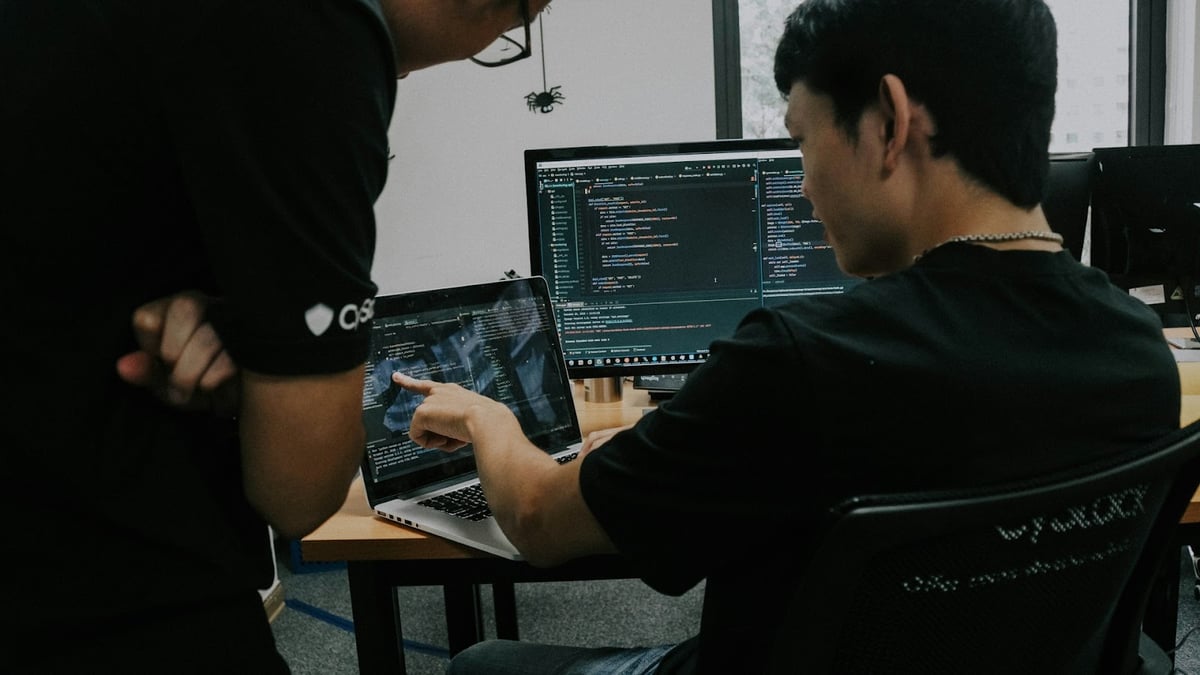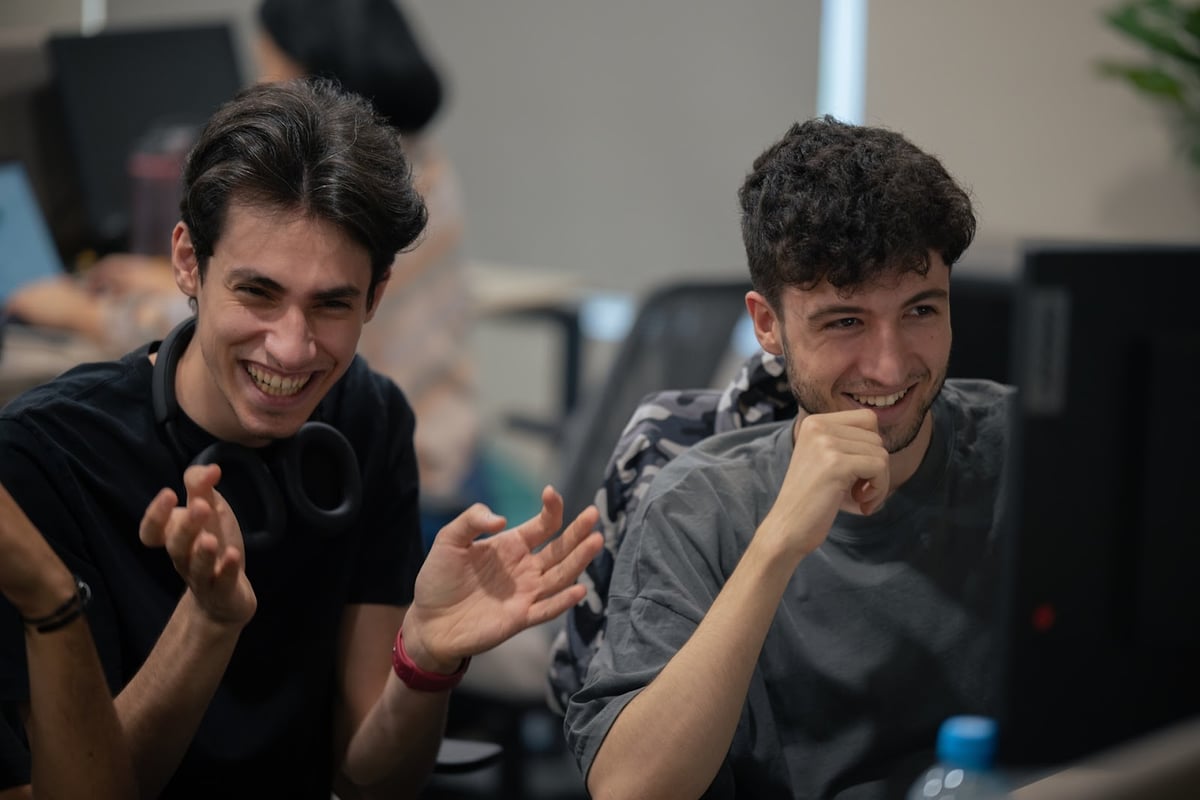The idea of coding is a little intimidating when you're starting out.
It all looks like (and pretty much is) a foreign language, but with the added complexities of logic and there being the opportunity to do things however you want, but then there's surely a wrong way to go about it, and then you need to choose your language, but which is best for your project or skills, and then…
Yeah, it's a lot.
Whether you're trying to break into the booming industry with a career, want access to those impressive paychecks, or simply want to expand your skills or perhaps work on a passion project, at some point, you'll need to commit to learning.
But just how difficult is coding to learn?
I'd be lying if I said it wasn't a challenge (otherwise, everyone would be doing it), but if you're ready to commit and really want to learn, what are you actually getting yourself into?
What does the path look like?
This guide breaks down everything you need to know. We're discussing where to start, the learning curves, and the moments you want to throw your keyboard out the window.
Don't worry; it's all learnable. All it takes is the right mindset, resources, and a dash of persistence.
Let's get into it.
Why coding can feel hard (let's be real about the learning process)

On the surface, coding is pretty easy to grasp.
You have an idea or a task you want to complete, and you write code so a computer can understand and execute it.
For example, imagine a keyboard. IF you press F, then display the letter "f". Repeat this for every key, and you have a working keyboard.
True, it can be that simple, but when you're working with servers, lots of uses, and lots of complex features that intertwine with each other and possibly aren't compatible, then you need to learn how to make things right.
For example, let's say you're building a chat app.
You start simple - when a user types a message and hits send, that message appears in the chat. Easy enough.
But then you need to make sure every user sees the message, not just the sender. And what happens if a user is offline? Should they see old messages when they log back in? What if two people send messages at exactly the same time - which one shows up first?
Suddenly, your simple chat feature needs databases, networking code, synchronization logic, and error handling.
That's why coding can quickly become complex. It's not just about the basic logic - it's about handling all the edge cases and making everything work together seamlessly.
And that's really the crux of coding.
There's no real defined right or wrong way to do it or to build a program. There are ways that don't work, and there are certainly more streamlined ways of doing things, but learning a language isn't cut and dry when it comes to outcomes.
You're basically just learning the tools and techniques, like learning how to use a paintbrush and mix paints, that will enable you to paint the big picture.
Some other reasons why it's hard:
It's like learning a new language (but way more logical)
Think back to when you first learned a foreign language, even just at a school level.
Remember those awkward moments of stumbling over pronunciation, mixing up verb tenses, and feeling like you'd never understand those weird grammar rules?
Well, coding is kinda like that. You're essentially learning a new language - one that communicates with computers. It has its own syntax, vocabulary, and logic. And just like any language, it takes time and practice to become fluent.
Abstract concepts can tie your brain in knots
Coding and object-oriented programming often deal with abstract concepts that aren't always easy to visualize or grasp. Variables, loops, functions, and data structures are programming concepts that aren't exactly things you encounter in everyday conversation.
It's like trying to assemble IKEA furniture without the instructions. You know there's a logical way to put it together, but figuring it out can be a real head-scratcher.
The frustration factor is REAL
People say that the art of writing is actually rewriting.
Writing a blog like this is easy. Rewriting and editing it to make it really good is the hard part. The same logic applies to coding.
Writing the first code out with proper functions and logic is easy. Making sure it actually works can be downright frustrating.
You'll encounter errors, bugs, and roadblocks that seem impossible to overcome. You might spend hours staring at a piece of code, wondering why it's not working, only to discover a tiny typo was the culprit.
It's okay to feel frustrated. It's part of the learning process. Just remember, every experienced coder has been there.
The "imposter syndrome" trap
As you're learning, it's easy to fall into the comparison trap. You see experienced coders and computer programmers effortlessly building complex projects and start to doubt your own abilities.
But here's the truth: Everyone starts somewhere. Those coding wizards you admire were once beginners, too. Don't let imposter syndrome hold you back.
Focus on your own progress, celebrate your wins, and remember that every line of code you write is a step forward.
The mindset shift: It's not about being a genius

So, with all that fresh in your mind, let's talk about how to actually be successful when learning code.
Most importantly, you'll need to adopt a productive and capable mindset. Most people who learn to code and give up or fall short do so because of their expectations and their approach, which may not have set them up for success.
Allow me to explain.
Growth mindset vs. fixed mindset
Imagine two people learning to code.
Person A hits a roadblock and thinks, "I'm just not cut out for this. I'm not smart enough." Person B hits the same roadblock and thinks, "This is tough, but I'll figure it out. I can learn this."
Person A has a fixed mindset - they believe their abilities are set in stone. Person B has a growth mindset - they believe their abilities can be developed through effort and learning.
Guess who's more likely to succeed?
Spoiler alert: It's Person B.
This means you must embrace the learning process (mistakes and all).
Coding isn't about being perfect; it's about progress.
You will make mistakes. You will get stuck. That's not a sign of failure; it's a sign that you're learning. The journey of learning programming involves navigating through various resources and pathways, from formal education to self-directed online courses.
Think of it like learning to ride a bike. You didn't just hop on and pedal away flawlessly, did you? There were wobbles, falls, and maybe even a few scraped knees. But with each attempt, you got a little better, a little more confident.
Coding is the same way.
Persistence is your superpower
The most successful coders aren't necessarily the ones with the highest IQs; they're the ones who refuse to give up. They embrace challenges, learn from their mistakes, and keep pushing forward, one line of code at a time.
The best way to go about this is to "find your why."
What's driving you to learn to code?
Is it the dream of building your own app? The desire to switch careers and land a high-paying tech job? Or maybe it's simply the satisfaction of creating something from scratch.
For many, the goal of becoming a software engineer or data engineer serves as a powerful motivation, offering a clear career pathway and numerous learning opportunities.
Whatever your "why" is, hold onto it. It will be your fuel when things get tough.
Remember, coding isn't about being a genius. It's about having the right mindset, embracing the learning process, and persisting through challenges. With the right attitude, you can achieve anything you set your mind to.
Setting yourself up for success: No need to go it alone

Alright, you've got the right mindset. Now, let's equip you with the tools and strategies to make your coding journey as smooth as possible.
Choosing your first language: it's like picking your Hogwarts house
There are tons of programming languages out there, each with its own strengths and quirks. It's like choosing your Hogwarts House - you want one that fits your personality and goals.
If you're into web development, HTML, CSS, and JavaScript are your go-to trio. Dreaming of building mobile apps? Swift for iOS or Kotlin for Android might be your calling. Data science enthusiast? Python's your best friend.
For beginners, some of the easiest coding languages include Python, JavaScript, and Ruby. These languages are known for their simplicity and readability, making them ideal for newcomers to programming.
Do a little research, see what interests you, and don't be afraid to experiment. There's no "one size fits all" when it comes to a programming language.
Find the best, relevant learning resources
The internet is a goldmine of coding resources. From free tutorials and interactive platforms to comprehensive online courses and bootcamps, there's something for every learning style and budget.
Some of my personal favorites include:
- FreeCodeCamp: A non-profit organization offering interactive coding challenges and projects.
- Codecademy: An online platform with interactive lessons and quizzes.
- Khan Academy: Offers free coding tutorials for beginners.
- Coursera and Udemy: Host a wide range of coding courses from top universities and industry experts.
Don't be afraid to explore and find what works best for you. And remember, learning from multiple sources can give you a well-rounded understanding.
Structure & consistency: Your coding workout plan
Learning to code is like going to the gym. You wouldn't expect to get ripped by lifting weights once a month, right? The same goes for coding. Consistency is key.
Create a learning schedule and stick to it. Even if it's just 30 minutes daily, make coding a regular routine. Set realistic goals, track your progress, and celebrate your wins along the way.
Build your coding crew: You don't have to go it alone
Coding can sometimes feel isolating, especially when you're staring at a stubborn error message at 2 AM. But remember, you're not alone!
Join online communities, forums, or coding meetups. Connect with other learners, share your struggles, and celebrate your successes together. And if you're craving more personalized guidance, consider finding a mentor on Mentorcruise.
Having someone to answer your questions, offer advice, and keep you motivated can make a world of difference.
Remember, learning to code is a journey, not a sprint. Set yourself up for success by choosing the right resources, creating a structured learning plan, and surrounding yourself with a supportive community.
Overcoming challenges & boosting your problem-solving skills

Okay, let's talk about the elephant in the room: the challenges. Coding isn't always a smooth ride.
There will be bumps, detours, and moments when you feel like giving up. But fear not; we're here to equip you with the tools to navigate those tricky situations.
Learn to debug properly
Errors and bugs are an inevitable part of coding. It's like baking a cake - sometimes it comes out perfectly, other times it's a bit…flat.
The key is to approach debugging like a detective. Don't panic; take a deep breath and start investigating. Read the error message carefully, retrace your steps, and use online resources (like Stack Overflow) to see if others have encountered similar issues.
Remember, every bug you squash is a victory, and each debugging session sharpens your problem-solving skills.
Getting unstuck: when the code hits the fan
Sometimes, you'll hit a wall. You'll stare at your code for hours, try every solution you can think of, and still make zero progress. It's frustrating, but it happens to the best of us. Persistence and continuous effort are crucial as you learn programming.
Here are a few strategies to get unstuck:
- Take a Break: Step away from your computer, go for a walk, or do something completely unrelated to coding. Sometimes, a fresh perspective is all you need. Rubber Duck
- Debugging: Explain your code line by line to an inanimate object (like a rubber duck). The act of explaining often helps you identify the problem.
- Seek Help: Reach out to online communities, forums, or your mentor. Sometimes, a fresh pair of eyes can spot the issue you're missing.
- Revisit the Fundamentals: If you're really struggling, go back to the basics. Review tutorials, practice exercises, and solidify your understanding of the core concepts.
Staying motivated: keep the fire burning
Learning to code is a marathon, not a sprint. There will be days when you feel discouraged, unmotivated, or like you're not making progress.
Here are some tips to keep the fire burning:
- Celebrate small wins: Acknowledge your achievements, no matter how small. Did you finally fix that pesky bug? Celebrate! Did you complete a challenging tutorial? Pat yourself on the back!
- Work on Passion Projects: Choose a project that excites you, something you're genuinely interested in building. This will make coding feel less like work and more like play.
- Connect with the Community: Surround yourself with other learners and experienced coders. Their enthusiasm and support can be contagious.
Dealing with imposter syndrome
Imposter syndrome is that nagging voice in your head that tells you you're not good enough, that you don't belong in the coding world. It's a common experience, but don't let it derail your progress.
Focus on Your Progress: Look back at how far you've come. Remember those early days when you struggled to write a simple "Hello, World" program? Now look at you!
Seek Feedback: Ask for constructive criticism from mentors, peers, or online communities. This can help you identify areas for improvement and boost your confidence.
Celebrate Your Achievements: Don't be afraid to toot your own horn! Share your projects, talk about your successes, and own your accomplishments.
Remember, challenges are part of the journey. The rewards are so incredibly worth it.
Why coding is worth the effort

Alright, let's take a moment to look beyond the challenges and talk about the incredible rewards that await you on the other side.
Career opportunities: your ticket to the tech world
Let's face it: coding skills are in high demand. In today's digital age, virtually every industry relies on technology, and that means there's a growing need for people who can speak the language of computers.
A degree in computer science can be beneficial for landing programming jobs, but it's not always necessary, as many employers prioritize skills over formal education.
Whether you're dreaming of building the next viral app, working for a cutting-edge tech company, or freelancing from a beach in Bali, coding can open doors to a world of exciting career opportunities.
And with the tech industry booming, the earning potential is sky-high, with top earners hitting around the $150,000 per year mark.
Software engineering is another promising career path, offering opportunities for apprenticeships and mentorships that can lead to a rewarding career in coding.
Problem-solving skills: level up your brain
Coding and committing to writing code is like a mental gym for your brain. It forces you to think logically, break down complex problems into smaller, manageable steps, and develop creative solutions.
These problem-solving skills aren't just valuable in the tech world; they're transferable to all areas of life. Whether you're troubleshooting a household appliance or tackling a complex project at work, coding will equip you with the mental tools to approach any challenge with confidence.
Creativity and expression: build your digital masterpiece
Coding isn't just about logic and problem-solving; it's also a form of creative expression. You have the power to build websites, design games, create animations, and bring your ideas to life in the digital world.
It's like having a blank canvas and a set of digital paintbrushes. The possibilities are endless, and the only limit is your imagination.
Personal empowerment: the confidence boost you deserve
Learning to code is an accomplishment. It's a testament to your dedication, perseverance, and willingness to step outside your comfort zone.
Imagine the sense of pride you'll feel when you build your first website, create your first app, or solve a complex coding challenge. That feeling of empowerment is priceless, and it will spill over into other areas of your life.
So, is coding hard to learn?
Yes, it can be. But is it worth the effort?
Absolutely.
The rewards – both personal and professional – are immense. And remember, you don't have to do it alone. Find a mentor, connect with the community, write code, and embrace the journey.
Wrapping up
So, here's the deal: Coding isn't a walk in the park, but it's also not rocket science. It's a skill, and like any skill, it takes time, effort, and the right guidance to master.
But trust me, the payoff is HUGE. From lucrative career opportunities to the sheer joy of creating something from scratch, coding is a superpower worth having in your arsenal.
So, are you ready to take the plunge?
Choose your programming languages, set your goals, and start coding today. And remember, you don't have to navigate this journey alone.
Mentorcruise is your one-stop shop for finding experienced coders, tech professionals, and career coaches who can help you accelerate your learning, overcome challenges, and achieve your coding dreams.
Whatever your question, problem, or obstacle, you'll have access to an industry expert that has experience working at the likes of Uber, Google, Microsoft, Stripe, Apple, and many more.
When you learn from the best of the best, you can become one of them.
Now, enough procrastinating. Time to get coding.







